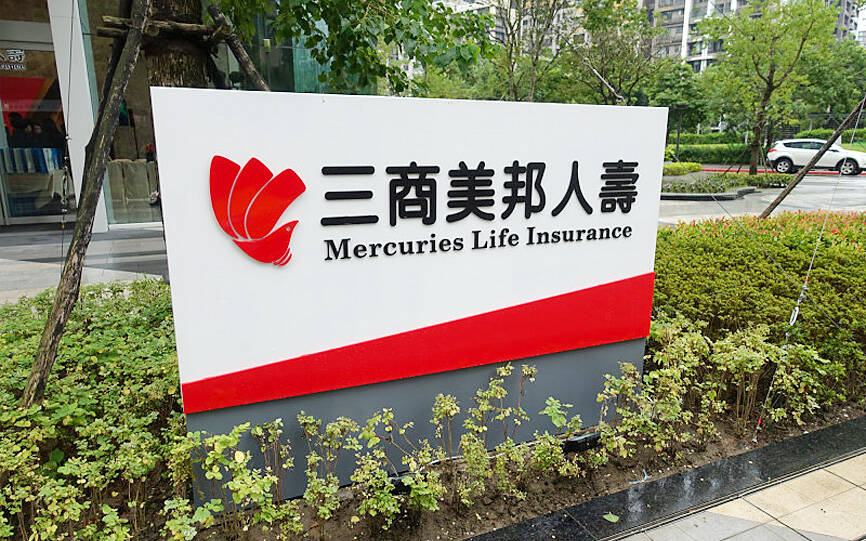The Financial Supervisory Commission (FSC) has banned Mercuries Life Insurance Co (三商美邦人壽) from trading with or granting credit to interested parties, and demanded detailed capital enhancement measures within a month to meet regulatory requirements.
The punitive measures do not affect old deals and should not cause substantive damage, but they should help the Taipei-based insurer improve its capital strength in a timely fashion, Insurance Bureau Deputy Director-General Tsai Huo-yen (蔡火炎) told a media briefing on Thursday.
Mercuries Life at the end of last year had a risk-based capital ratio of 111.09 percent and a net worth ratio of 2.97 percent, lagging behind the required minimums of 200 percent and 3 percent respectively, Tsai said, adding that the inadequacy dates back to the second half of 2022.

Photo: Wu Hsin-tien, Taipei Times
The remedial measures the company filed in May would not correct the inadequacy this year and beyond, not to mention the grave uncertainty involved, he added.
Mercuries proposed enhancement measures including the transfer of real estate as investment, the issuance of 300 million new common shares, the issuance of special debts through private placement, and the issuance of NT$5 billion (US$153.56 million) in subordinated bonds, Tsai said.
The official further cited the insurer as saying that the company plans to complete the issuance of common or special shares and convertible bonds next year and then conduct a review if supplementary measures are needed.
However, Mercuries Life has not yet inked a deal with potential investors over the timetable for share issuances and other details, raising doubts it could obtain the needed funds by the end of this year, Tsai said.
Even if all things were to go smoothly, the cash injection would only lift the company’s capital by a maximum of 30.4 percentage points to 180.4 percent, still below the 200 percent benchmark, the official said.
The insurer must come up with more concrete remedies detailing how and when it would comply with the capital requirements, Tsai said, adding that the commission would otherwise deal out further punishments.
Mercuries Life said it is working hard and has gained headway in bolstering its capital and protecting the interests of shareholders and policyholders.
Net income in the first half totaled NT$6.32 billion, or earnings of NT$1.24 per share, raising its net worth ratio to 3.34 percent and its risk-based capital to 150 percent, meaning the remedial measures would work if carried out successfully.
The financial improvement came from stable increases in fixed income and capital gains, bolstered by stock market rallies at home and abroad, the insurer said.
Profit improvement should be sustainable in the second half, as the US Federal Reserve is widely expected to lower interest rates toward the end of the year, which would be favorable to its bondholdings, it said.
Currency hedging costs would remain high in the short term, and the company would maintain active and balanced wealth management practices by guiding more cash to blue-chip stocks and add foreign debt without straining its liquidity, it said.

Taiwan will prioritize the development of silicon photonics by taking advantage of its strength in the semiconductor industry to build another shield to protect the local economy, National Development Council (NDC) Minister Paul Liu (劉鏡清) said yesterday. Speaking at a meeting of the legislature’s Economics Committee, Liu said Taiwan already has the artificial intelligence (AI) industry as a shield, after the semiconductor industry, to safeguard the country, and is looking at new unique fields to build more economic shields. While Taiwan will further strengthen its existing shields, over the longer term, the country is determined to focus on such potential segments as

UNCERTAINTY: Innolux activated a stringent supply chain management mechanism, as it did during the COVID-19 pandemic, to ensure optimal inventory levels for customers Flat-panel display makers AUO Corp (友達) and Innolux Corp (群創) yesterday said that about 12 to 20 percent of their display business is at risk of potential US tariffs and that they would relocate production or shipment destinations to mitigate the levies’ effects. US tariffs would have a direct impact of US$200 million on AUO’s revenue, company chairman Paul Peng (彭雙浪) told reporters on the sidelines of the Touch Taiwan trade show in Taipei yesterday. That would make up about 12 percent of the company’s overall revenue. To cope with the tariff uncertainty, AUO plans to allocate its production to manufacturing facilities in

COLLABORATION: Given Taiwan’s key position in global supply chains, the US firm is discussing strategies with local partners and clients to deal with global uncertainties Advanced Micro Devices Inc (AMD) yesterday said it is meeting with local ecosystem partners, including Taiwan Semiconductor Manufacturing Co (TSMC, 台積電), to discuss strategies, including long-term manufacturing, to navigate uncertainties such as US tariffs, as Taiwan occupies an important position in global supply chains. AMD chief executive officer Lisa Su (蘇姿丰) told reporters that Taiwan is an important part of the chip designer’s ecosystem and she is discussing with partners and customers in Taiwan to forge strong collaborations on different areas during this critical period. AMD has just become the first artificial-intelligence (AI) server chip customer of TSMC to utilize its advanced

Chizuko Kimura has become the first female sushi chef in the world to win a Michelin star, fulfilling a promise she made to her dying husband to continue his legacy. The 54-year-old Japanese chef regained the Michelin star her late husband, Shunei Kimura, won three years ago for their Sushi Shunei restaurant in Paris. For Shunei Kimura, the star was a dream come true. However, the joy was short-lived. He died from cancer just three months later in June 2022. He was 65. The following year, the restaurant in the heart of Montmartre lost its star rating. Chizuko Kimura insisted that the new star is still down